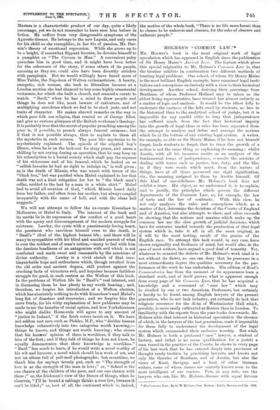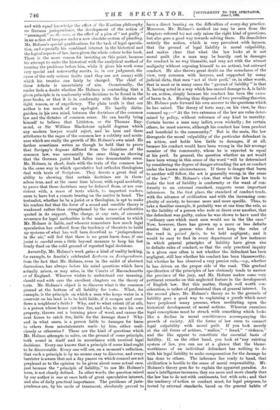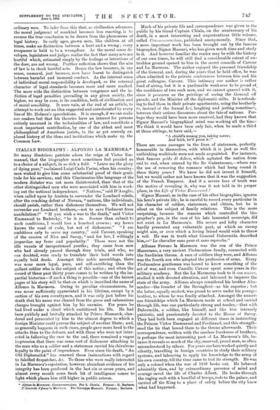HOLMES'S " COMMON LAW."*
MR. HOLMES'S book is the most original work of legal speculation which has appeared in English since the publication of Sir Henry Maine's Ancient Law. The feature which gives this special originality to Mr. Holmes's Common Law is, that the treatise exhibits in combination two different methods of treating legal problems. One school, of whom Sir Henry Maine is the most brilliant English example, have examined legal insti- tutions and conceptions exclusively with a view to their historical development. Another school, deriving their parentage from Bentham, of whom Professor Holland may be taken as the ablest living representative, have treated law almost entirely as a matter of logic and analysis. It would be the idlest folly to underrate the vastness of the debt owed by students, no less to the historical than to the analytical school of jurists, but it is impossible for any candid critic to deny that jurisprudence has suffered much, from the fact that historical inquiry into the growth of legal ideas or rules has been separated from the attempt to analyse and define and arrange the notions which lie at the bottom of any existing legal system. A writer, for example, so able as Sir Henry Maine, if he does not himself forget, leads students to forget, that to trace the growth of a action is not the same thing as explaining its meaning ; whilst Austin, with all his immense merits as an analyzer of the fundamental terms of jurisprudence, ccmmits the mistake of dealing with terms such as justice, law, duty, and the like, as if they were words which must, from the nature of things, have at all times possessed one rigid signification, viz., the meaning assigned to them by Austin himself. Of this kind of one-sidedness Mr. Holmes's book does not exhibit a trace. His object, as we understand it, is to explain, and to justify, the principles which govern the different departments of the Common Law, as, for example, the law of torts and the law of contracts. With this view, he not only analyses the rides and conceptions which, as a matter of fact, determine the decisions of the Courts of England and of America, but also attempts to show, and often succeeds in showing, that the notions and maxims which make up the common law are the slow growth of judicial decisions, which have for centuries tended towards the production of that legal system which is, take it all in all, the most original, as it will be the most lasting, result of the genius of the English race. To attempt this task would, in any case, have shown originality and freshness of mind, but would also, in the case of most writers, have argued a good deal of temerity. Yet, whatever be counted the defects of Mr. Holmes's work (and it is not without its flaws), no one can deny that he possesses in a most extraordinary degree the qualities necessary for the per- formance of the work he has undertaken. His edition of Sent's Commentaries has from the moment of its appearance been a
standard work, and of itself proves, what is apparent enough from every page of his Common Law, that he has acquired a knowledge and a command of " case law " which may be rivalled by one or two American Professors, but certainly is hardly to be found among English lawyers of the present generation, who do not lack industry, yet certainly do lack that religious reverence for the dicta of Westminster Hall which, possibly, is more easily cultivated at Boston than in London. To familiarity with the reports from the year-books downwards, Mr.
Holmes adds that interest in historical speculation the absence of which, in the lawyers of the last generation, made it impossible for them fully to understand the development of the legal system which commanded their exclusive worship. But while Mr. Holmes is both a profound " case " lawyer, a student of history, and (what is no mean qualification for a jurist) a man versed in the practice of the Courts, he shows in every page
of his last work that he has entered deeply into provinces of thought rarely trodden by practising lawyers, and knows not only the theories of Bentham, and of Austin, but also the views of Kant, Savigny, and a " host of other German writers, some of whose names are scarcely known even to the most intelligent of our readers. Few, at auy rate, are the lawyers who can, like Mr. Holmes, discuss with equal fervour
• The Common Law. By 0. W. Holmes, Jun. Boston : Little, Brown, and Co. 1891.
and with equal knowledge the effect of the Kantian philosophy on German jurisprudence, the development of the action of " assumpsit" on the case, or the effect of a plea of " not guilty " in an action of trespass under a now obsolete system of pleading. Mr. Holmes's special qualifications for the task of legal specula- tion, and especially his combined interest in the historical and the logical aspects of law, have given the whole colour to his book. There is the more reason for insisting on this point, because his attempt to unite the historical with the analytical method of treating the problems before him, while it gives his work some very special and noteworthy merits, is, in our judgment, the cause of the only serious faults (and they axe not many) with which his treatise can fairly be charged. The chief of these defects is uncertainty of aim. Occasionally, the reader feels a doubt whether Mr. Holmes is contending that a given principle is in conformity with decisions to be found in the year-books, or that it is in conformity with the dictates of right reason, or of expediency. The plain truth is that our author is too much of an apologist. He hardly distin- guishes, in his own mind, between the doctrines of the common law and the dictates of common sense. He can hardly bring himself to believe that Littleton, or Sir Thomas Ray- mond, or Sir William Blackstone upheld dogmas which any modern lawyer would reject, and he here and there attributes to the sages of the common law a subtlety and acute- ness which are really the growth of Mr. Holmes's own mind. He farther sometimes writes as though he held that to prove that Savigny's dogmas differed from the doctrines of the common law, was necessarily the same thing as showing that the German jurist had fallen into demonstrable error. Mr. Holmes, in short, deals with the texts of the common law in the same way in which speculative but orthodox theologians deal with texts of Scripture. They devote a great deal of ability to showing that certain doctrines are in them- selves true, and at the same time labour, with equal assiduity, to prove that these doctrines may be deduced from, or are con- sistent with, a mass of texts which, to impartial readers, seem to have but a remote bearing on the matter in hand. The textualist, whether he be a jurist or a theologian, is apt to make his readers feel that the force of a sound and sensible theory is weakened rather than strengthened by the mass of authorities quoted in its support. The charge, at any rate, of excessive reverence for legal authorities is the main accusation to which Mr. Holmes is liable, and whoever remembers how much legal speculation has suffered from the tendency of theorists to build up systems of what has well been described as "jurisprudence in the air," will feel that there is no great harm done, if one jurist is careful even a little beyond measure to keep his feet firmly fixed on the solid ground of reported legal decisions.
Assuredly, Mr. Holmes's work gains a kind of reality lacking, for example, to Austin's celebrated Lectures on Jurisprudence, from the fact that Mr. Holmes, even in the midst of abstract discussions, has always before his mind questions which have actually arisen, or may arise, in the Courts of Massachusetts or of England. Whoever wishes to understand our meaning, should read with care the excellent chapters on the theory of torts. Mr. Holmes's object is to discover what is the common ground at the bottom of all liability for torts. What, for example, is the principle on which a man who keeps water in a reservoir on his land is to be held liable, if it escapes and over- flows a neighbour's fields ? Why, and to what extent (if at all), is a person whose house catches fire, and who, to save his own property, throws out a burning piece of wood, and causes the next house to catch fire, liable for the damage done ? Why, and in what cases, is a person liable to damages for harm to others from misstatements made by him, either mali- ciously or otherwise ? These are the kind of questions which Mr. Holmes attempts to solve, on the ground of some principle, both sound in itself and in accordance with received legal decisions. Every one knows that a principle of some kind ought to be discoverable. Every one will see, on a moment's reflection, that such a principle is by no means easy to discover, and every barrister is aware that not a day passes on which counsel are not perplexed as to the opinion to be given about some actual case, just because the " principle of liability," to use Mr. Holmes's term, is not clearly defined. In other words, the question raised by our author is one at once both of great speculative interest, and also of daily practical importance. The problems of juris- prudence are, by his mode of treatment, absolutely proved to have a direct bearing on the difficulties of every-day practice. Moreover, Mr. Holmes's method (as may be seen from the chapters referred to) not only raises the right kind of questions, but also goes a good way towards solving them. He demolishes entirely the notion, which is very prevalent with laymen, that the ground of legal liability is moral culpability, and makes clear that what the law looks at is not moral guilt (for a man may be heavily cast in damages for conduct in no way blamable, and may act with the utmost malignity without exposing himself to an action), but outward conduct. He also throws great doubt on the soundness of the view, very common with lawyers, and supported by many judicial dicta, that men " act at their peril," or, in other words, that in most or in many cases the " ground of liability " is that X, having acted in a way which has caused damage to A, is liable to an, action, simply because his conduct has been the cause of harm to A. Having thus disposed of two prevailing theories, Mr. Holmes puts forward his own answer to the questions which he has raised. The theory of torts may, on his view, be thus summed up :—" At the two extremes of the law are rules deter- mined by policy, without reference of any kind to morality. Certain harms a man may inflict, even wickedly ; for certain others, he must answer, although his conduct has been prudent and beneficial to the community." But in the main, the law disregards the moral culpability of the particular defendant in an action, and holds him liable to damages, if at all, because his conduct would have been wrong in the fair average member of the community, whom he is expected to equal at his peril. In general, the question whether an act would have been wrong in this sense of the word "will be determined by considering the degree of danger attending the act or conduct under the known circumstances. If there is danger that harm to another will follow, the act is generally wrong, in the sense of the law." Mr. Holmes's view, that what the law tends to make the test of liability is conformity or the want of con- formity to an external standard, suggests some important inferences. In the first place, the standard of conduct tends, with the advance of civilization and with the increasing com- plexity of society, to become more and more specific. Thus, to take a familiar example, it probably was at one time the rule, as to the liability of a person who rode or drove over another, that the defendant was guilty, unless he was shown to have used the " ordinary care which most men would use in the like case." Now, however, there has grown up a more or less definite maxim that a person who does not keep the rules of the road is, prints facie, to be held negligent ; and it would be easy to find in every department of law instances in which general principles of liability have given rise to definite rules of conduct, so that the only practical inquiry in a given case often is not whether the defendant has been negligent, still less whether his conduct has been blameworthy, but whether he has observed a very precise rule,—e.g., whether he has driven on the proper side of the road. This gradual specification of the principles of law obviously tends to narrow the province of the jury, and Mr. Holmes makes some very pertinent remarks on this neglected feature in the development of English law. But this matter, though well worth con- sideration, is rather of professional than of general interest. In the second place, Mr. Holmes's theory as to the grounds of liability goes a good way to explaining a puzzle which must have perplexed many persons, when meditating upon the historical development of moral notions. Whoever examines legal conceptions must be struck with something which looks like a decline in moral sensitiveness accompanying the growth of society. All the forms of law seem to connect legal culpability with moral guilt. If you look merely at the old forms of actions, "malice," " fraud," "violence," and the like appear to constitute the essential basis of liability. If, on the other hand, you look at 'any existing system of law, you can see at a glance that the blame- worthiness of an individual defendant has nothing to do with his legal liability to make compensation for the damage he has done to others. The inference lies ready to hand, that civilization is hostile to the sense of moral responsibility. Mr. Holmes's theory goes far to explain the apparent paradox. As men's intelligence increases, they see more and more clearly that the law has to do not with sentiments, but with acts ; and that the tendency of action or conduct must, for legal purposes, be tested by external standards, based on the general habits of ordinary men. To infer from this that, as civilization advances, the moral judgment of mankind becomes less exacting, is to reverse the true conclusion to be drawn from the phenomena of legal history. In early ages, grown men, like children at all times, make no distinction between a hurt and a wrong; every trespasser is held to be a wrongdoer. As the moral sense de- veloper, legislators and judges realise the fact that many acts are hurtful which, estimated simply by the feelings or intentions of the doer, are not wrong. Further reflection shows that the aim of law is to check hurtful acts. Hence the law becomes, in one sense, unmoral, just because, men have learnt to distinguish between harmful and immoral conduct. As the internal sense of individual moral responsibility is developed, so the external character of legal standards becomes more and more marked. The more wide the distinction between vengeance and the in- fliction of legal penalties prevailing in any given society, the higher, we may be sure, is its condition, both of civilisation and of moral sensibility. It were vain, at the end of an article, to attempt to work out an idea suggested and corroborated by every line of Mr. Holmes's speculations. It is enough, if we can make our readers feel that his theories have an interest for persons entirely unversed in the technicalities of law, and constitute a most important contribution, by one of the ablest and most philosophical of American jurists, to the as yet scarcely ex- plored history of the ideas and institutions which make up the Common Law.
















































 Previous page
Previous page